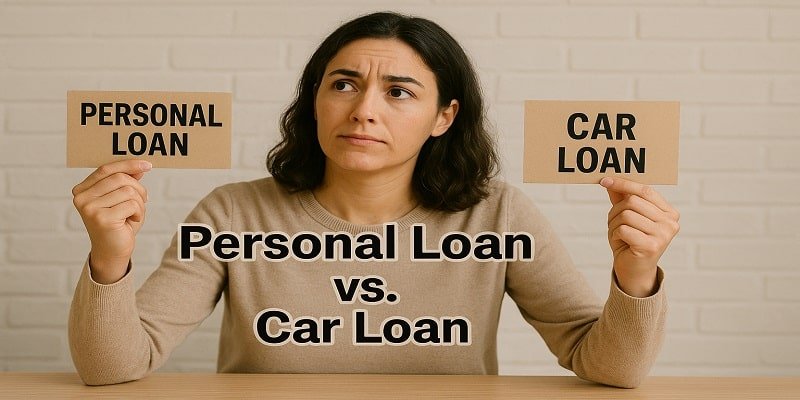“Personal Loan vs Car Loan”
Personal Loan vs Car Loan: If you’re looking to borrow money, you might consider a personal loan or a car loan. Both can help you finance a big purchase, but they work differently. Understanding these differences can save you both money and stress.
In this guide, we’ll explain the 10 key differences between personal loans and car loans in simple terms. By the end, you’ll know which option is best for your needs.
1. Loan Purpose
Car Loans: For Vehicles Only
Car loans (or auto loans) are specifically for purchasing vehicles, new or used. Lenders know exactly what you’re using the money for, so they can offer lower interest rates.
Personal Loans: Flexible Uses
Personal loans can be used for almost anything—home repairs, medical bills, vacations, or even a car. Since lenders don’t put a limit on spending, interest rates can be high.
🔗 Learn more about car loans from the Consumer Financial Protection Bureau (CFPB).
2. Secured vs. Unsecured Loans
Car Loans: Secured by the Vehicle
Car loans are secured, meaning the car itself acts as collateral. If you don’t make payments, the lender can repossess it.
Personal Loans: Usually Unsecured
Most personal loans are unsecured, meaning no collateral is required. However, this makes them riskier for lenders, which leads to higher interest rates.
3. Interest Rates
Car Loans: Low Rates
Since the loan is secured, car loan interest rates are often low (sometimes as low as 3-5% for borrowers with good credit).
Personal Loans: High Rates
Personal loans are riskier for lenders, so rates can range from 6% to 36%, depending on credit score.
🔗 Compare rates at Bankrate.
4. Loan Terms (Repayment Term)
Car Loans: Long Term
Car loans often last 3 to 7 years, which leads to lower monthly payments.
Personal Loans: Short Term
Personal loans typically last from 1 to 5 years, which means higher monthly payments but lower total interest.
5. Down Payment Requirements
Car Loans: Often Require Down Payment
Many lenders ask for a 10-20% down payment on car loans to reduce risk.
Personal Loans: No Down Payment Required
Since personal loans are not tied to a purchase, there is no down payment required.
6. Impact on credit score
Car loans: It may be easier to get
Some lenders specialize in bad credit car loans and approve even with lower scores.
Personal loans: Strict requirements
Personal loans often require good to excellent credit (670+ FICO) for the best rates.
7. Speed of funding
Car loans: Fast at dealerships
Dealers can sometimes approve car loans the same day.
Personal loans: Fast but not instant
Many online lenders approve personal loans within 1-3 business days.
🔗 Check out fast lenders at NerdWallet.
8. Vehicle ownership
Car loans: Lender retains ownership
In the case of a car loan, the lender retains ownership until you pay it off.
Personal loans: The car is yours immediately
If you take out a personal loan, the car is yours outright—there’s no lien on the title.
9. Refinancing options
Car loans: Can be refinanced
If interest rates fall, you can refinance a car loan for better terms.
Personal loans: Harder to refinance
Refinancing a personal loan is less common and may not save much.
10. Penalties for early repayment
Car loans: Sometimes, there are penalties
Some lenders charge a fee for paying off a car loan early.
Personal loans: often no penalty
Many personal loans allow early repayment without any fees.
Which one should you choose?
✅ Get a car loan if:
- You’re buying a car
- You want low interest rates
- You can handle a longer repayment period
✅ Get a personal loan if:
- You need flexibility (not just for a car)
- You don’t want to risk repossession
- You have a strong credit score
Final thoughts: Personal Loan vs Car Loan
Both personal loans and car loans have their pros and cons. If you’re buying a car, a car loan usually offers better interest rates. But if you need money for other expenses, a personal loan offers more freedom.
Before you decide, compare lenders, check your credit score, and calculate the total costs. Borrowing wisely saves money in the long run!
🔗 For more financial tips, visit The Motley Fool.
Did this help? Let us know in the comments!
FAQs: Personal Loan vs Car Loans
1. Which is easier to get, a personal loan or a car loan?
A car loan is often easier to get, especially with a poor credit score, because the vehicle guarantees the loan. Personal loans usually require a better credit score.
2. Can I use a personal loan to buy a car?
Yes! A personal loan can be used to buy a car, but the interest rates can be higher than a dedicated car loan.
3. Do car loans or personal loans have lower interest rates?
Car loans usually have lower rates because they’re secured by the vehicle. Personal loans are riskier for lenders, so the rates are higher.
4. Can I pay off a car loan or personal loan early?
Many personal loans allow early repayment without any penalty, while some car loans charge a fee for early repayment.
5. Which loan builds credit faster?
Both help build credit if paid on time, but car loans may be slightly better as these are loans with longer term installments.
More Like This-


